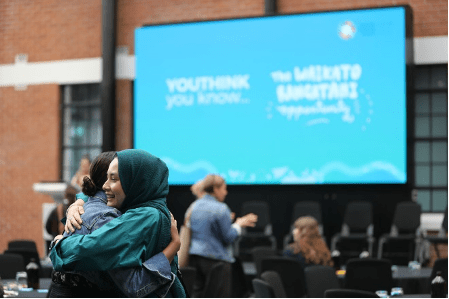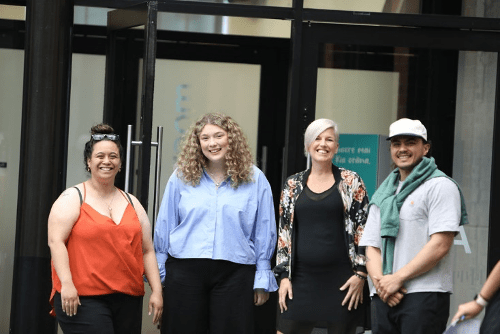Rangatahi Opportunity Project
The Rangatahi Opportunity Project reached a major milestone with the launch of our Case for Change “YouThink You Know” on 26 October. An event at the WINTEC Atrium was attended by community, government, philanthropic, youth and iwi leaders from across the Waikato.
As well as sharing the major findings from our multi-year research, the event also celebrated our rangatahi and showed their incredible talent and potential. We were thrilled to host performances from Dujon Cullingford, Rosalie Norton, Beau Monga and Street Dance Sessions.
With facilitation from our fantastic MC Jahvaya Wheki, panellists Tamoko and Waimirirangi Ormsby, Madiha Ali and Oli Semu reflected on their own journeys as rangatahi in the Waikato.
We also heard from a small selection of leaders who are advancing exciting and new projects to address the opportunities we explored in the Case for Change. These included Mary Jensen and the team from Smart Waikato, Talita Piso and the team from Vision Complete Pathways, the Western Community Centre and K’aute Pasifika and Te Wānanga o Aotearoa.
The emerging insights from our interviews and desktop research are set out below. A more detailed summary is provided in the Case for Change:
- The lives of rangatahi are enhanced when a kaiārahi supports them to navigate life, not just as a one-off, but along the journey
- Rangatahi want to give back to their whānau, community and future generations
- Rangatahi feel unprepared when leaving school
- Rangatahi need a strong sense of belonging to thrive
- Rangatahi want their strengths + cultural identity to be recognised and supported
- Rangatahi need more support for their emotional and mental wellbeing
- Rangatahi experience barriers because of the effects of structural inequities.
Combining our different sources of insight, the Case for Change has identified the following opportunities for action:
The here and now (immediate actions):
- Including the voices and lived experience of whānau, rangatahi and employers.
- Addressing Equity in Education.
- Partnering with Māori at all levels of decision making.
- Support and scale programmes that provide access to coaching and mentoring for young people.
Creating transformation for the future (medium term priorities):
- Improving access to holistic services that focus on enhancing mental and emotional wellbeing for rangatahi.
- Re-imagining the funding model to encourage collaboration.
- Supporting and scaling innovation across schools, businesses and the community to support rangatahi and their whānau.
- Addressing systemic barriers for tamariki and whānau in the early years.
Many people and organisations are involved in rangatahi wellbeing in the Waikato and across New Zealand. While a report alone won’t achieve impact, the intended role of our Case for Change is:
- As a strategic business case, supporting front-line rangatahi wellbeing organisations to secure the funds and resources they need to succeed
- As a guide for policy makers when assessing where to intervene and what sorts of interventions to support
- As a resource for funders who are motivated to make a difference, and are keen to know where to get the best “bang for their buck”; and
- As a source of inspiration, hope and pride for our rangatahi. We want our young to know that when we say they are our future -we mean it
For more information on the Rangatahi opportunity project, go to our website: Waikato Rangatahi Opportunity Case for Change | Waikato Wellbeing Project.



